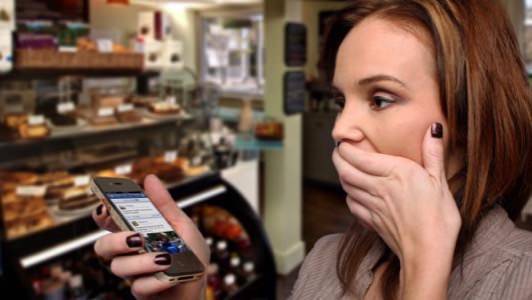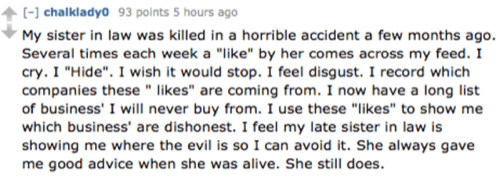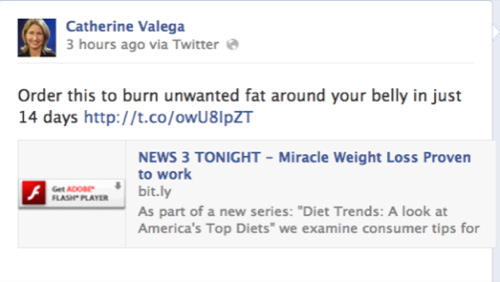
UPDATED: This story has been updated to include comments from Facebook. See below.
Our story about dead people liking stuff on Facebook really struck a nerve. For some people this phenomenon isn’t just strange — it is downright painful. Like this person who commented on Reddit:

To help people avoid that situation, we’re working on a post that will help you figure out how to “memorialize” the account of someone who has died so that Facebook won’t keep surfacing their likes in your feed.
Send Us Your Examples
Meanwhile we’re looking for more examples of fake likes. Our writer, Bernard Meisler, put his story together by asking people he knew on Facebook to look out for fake likes and send him examples. Now we’d like to find even more.
Apparently this is happening a lot, and nobody seems to know why.
Facebook told us it must be people accidentally pressing a “like” button on their mobile app. But can there really be that many people pressing the wrong button, all the time?
If you have a theory, we’re all ears.
My Friend The Financial Planner
Meanwhile, everyone we talk to seems to have a story about fake likes. Just this morning when I came in to work I opened up Facebook and found this:

It’s a post that went out this morning from my friend and neighbor, Catherine Valega, touting a new “miracle weight loss” cure that can “burn unwanted fat around your belly in 14 days.”
I got suspicious. First because Valega is teeny-tiny. She’s an avid runner and probably weighs 100 pounds soaking wet. She’s not someone I’d expect had ever used (or needed) a miracle weight loss cure.
More important, Valega is a financial planner and a wealth management specialist who lives in an affluent suburb of Boston. She uses Facebook to promote her professional services and to build her personal brand. Most of her posts are about college saving, retirement planning, insurance coverage — useful stuff.
So I didn’t think she’d be polluting her feed with crappy posts about belly fat reducers.
And I was right. Valega had no idea this had gone out under her name until I snapped a screen grab and emailed it to her. She was appalled, and removed it from her feed.
[UPDATE: Facebook points out that the example above originated on Twitter, not on Facebook, which means Facebook should not be blamed for it. Also: A Facebook spokesman says there are cases where someone has liked a brand but simply doesn’t remember doing it. In other cases it’s possible someone got confused and clicked on an icon believing they were “liking” one thing when actually they were liking something different. For example, you might click on an icon for what you think is a new DVD release when you are in fact liking the retailer that is promoting the DVD. Finally, there are cases of “click-jacking” where people believe they are clicking on, say, a button to play a video, when actually they are being tricked into liking a product. In those cases the like goes out into their feed without their knowledge or consent. However, Facebook has been making a big effort to fight click-jacking, and has been successful in stamping out most of it, the spokesman says.]
A Problem For Facebook
Sure, in a way this is kind of funny, but it’s also kind of not. If you’re using Facebook in any kind of professional capacity, these fake likes could become a problem.
Not just a problem for you, but for Facebook. Because if the new reality of Facebook is that you need to constantly check your profile and make sure stupid stuff isn’t going out under your name, people are going to start leaving.
Valega wasn’t pleased by the belly fat thing, but she’s more worried about what might happen next. One of her friends who would never shop at Walmart just had a “like” for Walmart go out under her name.
Valega’s business, Greenbridge Wealth Management, is bulit around not just financial planning but social responsibility, sustainability, environmental awareness and other progressive ideas. A fake-like for Walmart could actually hurt her image.
“If Facebook shows people that I like Walmart, that’s a business buster,” Valega says. “No way would I like Walmart or invest in Walmart.”
Risky For Business
So being on Facebook becomes a risk. And what’s the reward? Valega says she’s never found a new client via Facebook. She just uses the site as a way to build a presence online. But now she thinks Facebook is “on the way out.”
So help us out. Has anyone you know ever fake-liked something on Facebook? Send us examples. Maybe we’ll get some answers from Facebook — or, even better, a resolution.
















